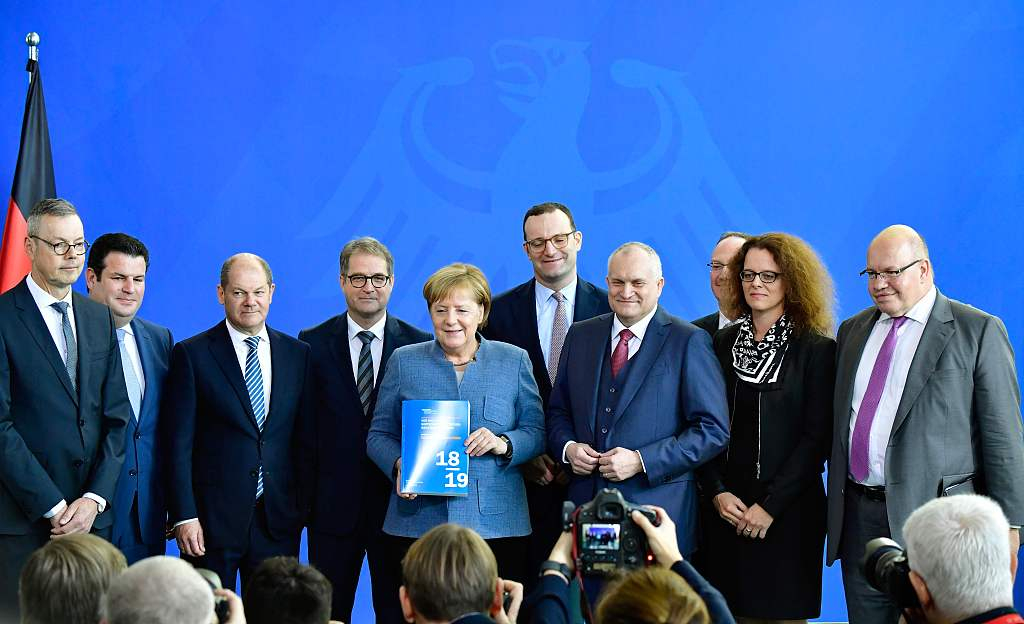
Bremerhaven in Germany is Europe's biggest port for car exports, January 22, 2014. /VCG Photo
Bremerhaven in Germany is Europe's biggest port for car exports, January 22, 2014. /VCG Photo
Editor's note: Dalia Marin is Chair of International Economics at the University of Munich and a research fellow at the Centre for Economic Policy Research. The article reflects the author's opinions and not necessarily the views of CGTN.
At just below 8 percent of GDP, Germany's current account surplus is the highest of any country in the world. Since the 2008 financial crisis, the size of the German surplus has raised hackles around the world, and it remains a topic of concern at the International Monetary Fund and other global institutions.
Nonetheless, early this year, Economy Minister Peter Altmaier's Scientific Advisory Council published a report with a conclusion that is nothing short of astonishing: Germany, the report says, has no available instruments to reduce its massive external imbalance.
That finding comes after repeated complaints about the German surplus from US President Donald Trump's administration, which has threatened to impose import tariffs and other protectionist measures. Even during former President Barack Obama's administration, the United States repeatedly called on the German government to reduce its surplus. More recently, the G20 made "global imbalances" one of its central areas of concern.
By suggesting that Germany cannot do anything about its current account balance, the Scientific Advisory Council of the Federal Ministry for Economic Affairs and Energy is not offering sound advice. The current account balance reflects the difference between exports and imports. To reduce its massive surplus, Germany can either reduce its exports or increase its imports, or do both at the same time. Both options are within the government's power to pursue.
For example, an expansion of imports can be achieved relatively easily through increased public investment. Oddly, the Scientific Advisory Board's report does not consider this simple and obvious solution, even though it well knows that Germany's current account surplus is the result of too much saving and too little investment. Not only does the German government balance its fiscal budget – known as the schwarze Null (black zero) – every year, but, as Bruegel's Guntram B. Wolff shows in Explaining Germany's Exceptional Recovery (which I edited), German companies also invest much less than their French and Italian counterparts do.
Investments typically induce higher imports. Building new roads, for example, usually requires additional construction machinery. This, in turn, requires additional intermediate inputs, which must be imported. Moreover, 30-40 cents of every additional euro the German government allocates toward public investment is spent on imports. Thus, an expansion of public investment would automatically reduce the current account surplus.
This is rather convenient, given that public investment also happens to be both popular and sorely needed. The German economy is slowing and on the verge of recession, owing largely to the relative slowdown in China, a leading importer of German manufactured goods. Since the financial crisis, German exports to China have almost tripled. But the same pace of growth cannot be expected to continue.

German Chancellor Angela Merkel holds the annual report of the German Council of Economic Experts on the country's economic development during a handover ceremony in Berlin, November 7, 2018. /VCG Photo
German Chancellor Angela Merkel holds the annual report of the German Council of Economic Experts on the country's economic development during a handover ceremony in Berlin, November 7, 2018. /VCG Photo
Under today's macroeconomic conditions, a cautious government would take steps to mitigate the coming economic downturn by investing more. Recent papers on the uses of fiscal policy at the zero lower bound conclude that public investment has become significantly more effective since the financial crisis. When short-term nominal interest rates are at or near zero, private investment is not crowded out, and the multiplier effect for public spending is stronger.
On the other side of the trade ledger, Germany also could try to reduce its exports by revaluing its currency. Although Germany has no control over the euro exchange rate, it could achieve the same effect as a currency appreciation through a fiscal revaluation that makes its exports more expensive and imports less so. This could be implemented through changes in tax policy. Research by Emmanuel Farhi and Gita Gopinath of Harvard University and Oleg Itskhoki of Princeton University shows that a reduction in the value-added tax (VAT) combined with an increase in income tax would result in what is effectively a currency appreciation.
In Germany's case, a fiscal revaluation now would be entirely justified, given that it previously pursued a tax-policy fiscal devaluation in the mid-2000s. As Fabio Ghironi of the University of Washington and Benjamin Weigert of the Bundesbank show in Explaining Germany's Exceptional Recovery, in 2008 Germany raised its VAT from 16 percent to 19 percent, but lowered its average income tax rate from 57 percent to 47.5 percent, and its corporate tax rate from 56.8 percent to 29.4 percent. This mix of policies made German exports significantly less expensive, and made imports more so, thereby contributing to the current account surplus. There is nothing stopping Germany from reversing these policies now.
Faced with a choice between expanding public investment and pursuing fiscal revaluation, the first option is preferable. With the economy already weakening, fiscal policies that could reduce the country's competitive advantage are too risky. But nor can Germany afford to do nothing. With multilateralism increasingly under threat, it has a duty to do its part to correct for global imbalances. The Scientific Advisory Council should know better.
Copyright: Project Syndicate, 2019.
(If you want to contribute and have specific expertise, please contact us at opinions@cgtn.com)